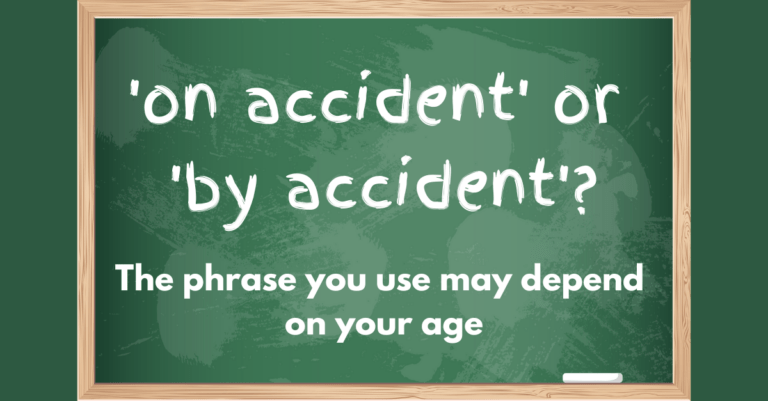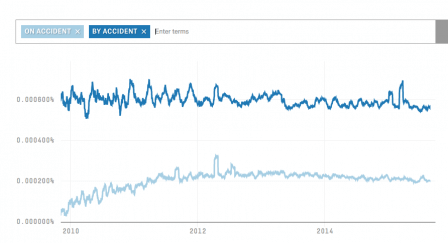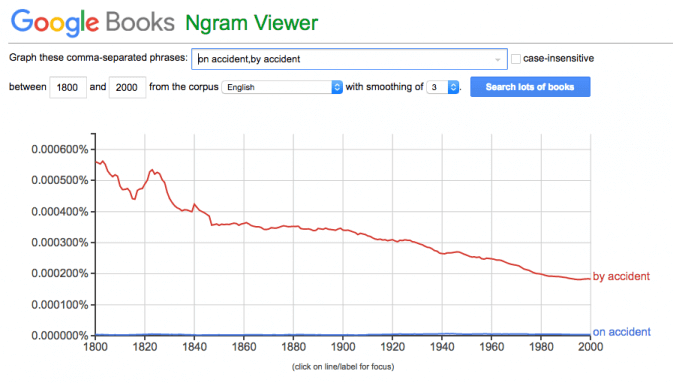Some of the most difficult questions I get are from non-native English speakers who want to know why we use a particular preposition in a specific phrase. Why do we say, “I’m in bed,” instead of “I’m on bed”? Do people “suffer from” a disease or “suffer with” a disease? Are we “in a restaurant” or “at a restaurant”? I’m a native English speaker, so my first thought is usually something like, “I don’t know why; ‘in bed’ just sounds right,” and sometimes both options are correct.
Here’s a question I hear regularly:
Hi, Grammar Girl. This is Tom Kennedy from Pleasanton, CA. What is the deal with the term “on accident”? I’ve always used “by accident,” but I’ve noticed a lot of pretty smart people . . . I’ve noticed them using “on accident.” So, am I wrong?
Sometimes when I get questions like this I can find an answer, and sometimes I can’t. In this case, I hit pay dirt! I was lucky enough to find an entire 2006 research paper on the topic, published by Leslie Barratt, a professor of Linguistics at Indiana State University.
Whether you say ‘on accident’ depends on your age
According to Barratt’s study, use of the two different versions appears to be distributed by age. Whereas “on accident” was common in people born after 1995, almost everyone born before 1970 said “by accident.” It’s really amazing: people born between 1970 and 1995 say “by accident” more often than “on accident,” but still use “on accident” a lot too. It looks like a directly age-related change in the way people are saying this phrase.
Reddit comments seem to confirm the study results
Barratt’s study was relatively small, surveying only about 280 people, but I also found slightly more recent evidence that “on accident” is relatively common among young people. The people at the website FiveThirtyEight made a tool that shows the frequency of words and phrases in more than a billion Reddit comments. It’s a lot like how you can search Google Books with Google Ngram, but it’s for Reddit, so instead of seeing how words are used in published books, you can see how words are used on the Internet, or at least on Reddit.
Reddit users tend to be young (91% were younger than 35 at the time I ran this search in 2016), so you would expect it to be a mix of people who prefer “on accident” and people who somewhat favor “by accident.” What you see is that Reddit commenters use “by accident” about three times as often as “on accident,” but that’s still a lot of people using “on accident.”
Why would people change what they say?
An interesting conclusion from Barratt’s paper is that although there are some hypotheses, nobody really knows why younger people all over the U.S. started saying “on accident” instead of “by accident.” For example, there’s the idea that “on accident” is parallel to “on purpose,” but nobody has proven that children all across the country started speaking differently from their parents because they were seeking parallelism.
Neal Whitman, a linguist and regular Grammar Girl contributor, speculated that the change could have come from a mishearing of “an accident” — for example, children mishearing “It was an accident” as “It was on accident”. But he also admits that this theory also doesn’t explain why “on accident” seemed to suddenly become the norm in people born after 1995.
Although I have no proof, I suspect that it must have something to do with nationwide media since it is such a widespread age-related phenomenon. “Barney & Friends” started airing in 1992, so maybe it’s Barney’s fault! Or there have been 19 seasons of Pokemon since 1999, so maybe Pokemon is to blame. If you know of a children’s show that uses “on accident” a lot and fits the timeline, let me know. [A listener named Paige Barker says “on accident” was used in the 1989 movie “Bill and Ted’s Excellent Adventure” “as humorous speech as a play on the phrase ‘on purpose’” and that her kids started saying it that way after watching the movie.]
Writers are using ‘by accident’ less often
Although Barratt’s study was about spoken English, I did do a Google Ngram search to check how “on accident” and “by accident” have been used in published books over the years. The use of “on accident” overall is very low compared to “by accident“, but it peaked in 1940 and has gradually fallen since.
I did see a small but steady decline in the use of “by accident” since around 1900, but it’s hard to say what that means beyond simply saying that it is a trend. Writers seem to be using “by accident” less often in general. Maybe children are being exposed to it less? But the drop is gradual. It’s not something so dramatic that it makes me think children would never read the phrase.
At this point, I think all we can say is that the change is one of those language things that happens sometimes.
Finally, although usage guides state that “on accident” is an error, and Shelly from Texas asked me to do what I can to ban “on accident,” Barratt found that there is no widespread stigma associated with saying “on accident.” In addition, it seems to me that as those kids who say “on accident” grow up (some of whom are even unaware that “by accident” is an option, let alone the preferred phrase of grown-ups) “on accident” will become the main, accepted phrase. By that time, there won’t be enough of us left who say “by accident” to correct them!






